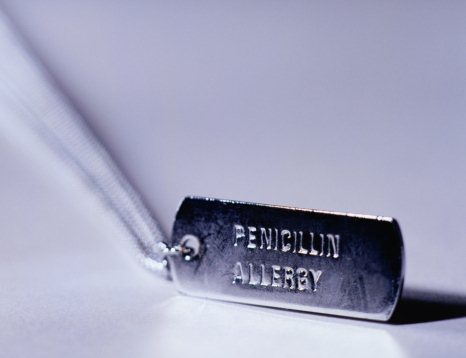PENICILLIN ALLERGY FAQ
 1. What is penicillin?
1. What is penicillin?
Penicillin was first discovered by Alexander Fleming in 1928 and continues to be one of the most important antibiotics today. The penicillin family of antibiotics contains over 15 chemically related drugs (e.g. penicillin, ampicillin, amoxicillin, amoxicillin-clavulanate, methicillin) that are given by mouth or injection for the treatment of many bacterial infections. It is one of the most frequently used classes of antibiotics in the world.
2. How common in penicillin allergy?
Approximately 10% of patients report an allergy to penicillin. However, the majority of patients (greater than 90%) may not truly be allergic. Most people lose their penicillin allergy over time, even patients with a history of severe reaction such as anaphylaxis.
3. How do I know if I am still allergic to penicillin?
A highly sensitive penicillin skin test is available to diagnose penicillin allergy and can be used to determine if you are allergic to penicillin. An allergist / immunologist can perform this testing, and if it is negative, there is a very high chance that the allergy is no longer present. An oral dose of penicillin or amoxicillin may also be given to confirm that it is safe to use this antibiotic.
4. Is penicillin allergy genetic?
There is no predictable pattern to inheritance of penicillin allergy. You do not need to avoid penicillin if a family member is allergic to penicillin or drugs in the penicillin family.
5. Do I need to see an allergist / immunologist if I already know that I am allergic to penicillin?
Even if you think you are allergic to penicillin, allergies change over time and it is worth discussing your history with your allergist / immunologist who may suggest testing to help clarify your allergy history. Even if your penicillin allergy is confirmed, you can still discuss alternative options if the need for antibiotics arises.
6. I was told that I was allergic to amoxicillin, do I still need to see an allergist / immunologist?
Amoxicillin is in the same family of antibiotics as penicillin. Your allergist / immunologist can review your history and perform skin testing to help you understand if you are still allergic to amoxicillin. This skin testing is similar to penicillin skin testing.
7. What will happen during my visit with the allergist / immunologist?
During your visit, you will likely discuss your history and prior reaction to penicillin. The allergist / immunologist will then consider skin testing using several different dilutions of penicillin. If the skin testing remains negative, then it is possible you will be given an oral dose of penicillin or amoxicillin. However, the allergist / immunologist will discuss the particular protocol they plan to use for skin testing with you at your visit. The actual skin testing itself is performed most commonly on either the forearm or back. Tests are done by pricking and injecting the skin.
8. Is skin testing painful and what are the risks?
A skin prick test, also called a scratch test, checks for immediate allergy and is the first step in skin testing. Skin prick testing is usually not painful. Skin prick testing uses needles (lancets) that barely penetrate the skin's surface. You won't bleed or feel more than mild, momentary discomfort. Intradermal skin testing is the second part of the evaluation and involves injecting the skin. The test, if positive, will cause local itching and redness with swelling at the site where the test is performed. These reactions usually resolve in an hour or so. Systemic reactions such as hives can occur, but are very rare and allergist / immunologists are prepared to treat such reactions.
9. If I'm allergic to penicillin, but I have an infection where only a penicillin will work, what do I do?
The answer to this is somewhat dependent on the type of reaction you experienced. However, if you have had specialized testing in the past that has indicated you are allergic to penicillin such as a skin test or oral challenge and have an infection that requires immediate treatment, the safest approach is to perform a procedure called desensitization. Most hospitals or clinics have access to an allergist / immunologist who can help facilitate this.
The typical process of desensitization has excellent success for patients who have experienced immediate reactions to penicillin and involves introduction of very tiny doses of the penicillin drug either orally or intravenously every 15-20 minutes over a period of 4 hours or so. At the end of this process, most patients can be safely treated with penicillin and dosed normally. However the procedure is only temporary and once treatment has finished, a repeat desensitization would be required if the antibiotic is needed again in the future. Unless you have had a positive skin test prior to desensitization, it is also recommended that you follow-up for specialized testing with an allergist / immunologist following desensitization as there is a still a very good chance that you are not really allergic and could tolerate penicillins without the need for desensitization in the future.
10. Do I need to avoid other drugs if I am allergic to penicillin?
This largely depends on your history and an allergist / immunologist can help clear this up. It is generally recommended that you avoid all drugs in the immediate penicillin family (amoxicillin, ampicillin, amoxicillin-clavulanate, dicloxacillin, nafcillin, piperacillin-tazobactam as well as certain drugs in the cephalosporin class (a closely related class to penicillins). Although the cephalosporins are close relatives of penicillins and share a structure called the beta-lactam ring, the risk of a cross-reactivity reaction between penicillins and cephalosporins remains <5%. Therefore, even with a true allergy to penicillin, there is an excellent chance you could tolerate cephalosporins.
11. Do I need to carry an epinephrine autoinjector for emergencies?
The decision of whether you need to carry an epinephrine autoinjector should be made after specialty consultation with your allergist / immunologist. In general, it is not recommended that patients who have a history of penicillin allergy carry an epinephrine autoinjector.
